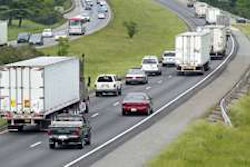The U.S. House Small Business heard testimony Feb. 9 on a new tax requirement the Owner-Operator Independent Drivers Association says will burden its members, while Congress examines legislation to repeal it.
Committee Chairman Sam Graves (R-Mo.) said the hearing, “Buried in Paperwork: A 1099 Update,” examined the expanded 1099 reporting requirements in Section 9006 of the Patient Protection and Affordable Care Act. The measure, effective next year, “was added to the health care law to help close the so-called tax gap by generating revenue to
pay for the law,” Graves said.
The impending IRS rule would require companies to file a Form 1099 on every business with which they spend at least $600 a year.
Small business owners testified on the toll it would take for them in money and time. Rep. Daniel Lungren (R-Calif.), who is sponsoring one of the legislative efforts to repeal it, also testified. His bill, the Small Business Paperwork Mandate Elimination Act or H.R.4, was referred to committee Jan. 12 and has 270 sponsors.
Todd Spencer, executive vice president of the Owner-Operator Independent Drivers Association, submitted written testimony for the hearing. On an annual basis, the owner-operator of one truck will make at least 100 fuel purchases for $600 from 50 or more fuel vendors. They also deal with many businesses for equipment maintenance, with each purchase usually exceeding $600.
On Feb. 2, the Senate approved an amendment to eliminate the new requirement, which was introduced by Sen. Debbie Stabenow (D-Mich.). It was included in the Federal Aviation Administration Air Transportation Modernization and Safety Improvement Act or S. 223, which senators are still considering.
Sen Carl Levin (D-Michigan), introduced another amendment to that proposed act, S.AMDT.28. It failed to achieve the required 60 votes for adoption and the Senate withdrew it.
Senators also are discussing another bill, identical to in content and title to Lungren’s bill. That bill, S.72, was introduced by Sen. Max Baucus (D-Mont.), and referred Jan. 25 to committee with 23 sponsors.








